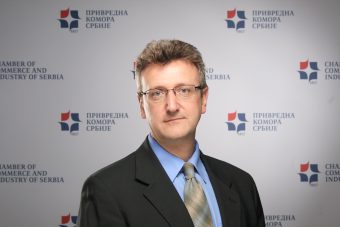
With talked with Dusan Stokic, Head of Department for Environmental Protection, Technical Regulations, Quality and Social Responsibility in the Serbian Chamber of Commerce, about the activities of this National Center for assistance and support to companies which take place through cooperation with CCIS division associations in all sectors, as well as through representation of interests, but also in many other ways.
EP: There is an opinion that Serbian companies, in the struggle for survival, are not too interested in the principles of sustainable development, and that only large or foreign companies invest their resources in the preservation of the immediate environment and in the care of the environment in general. Is this even true?
Dusan Stokic: The principles and goals of sustainable development have a universal, global character, but when transposed to the national level, they are converted into strategies, policies, laws, regulations and other acts. All companies, whether they are micro, small, medium or large and regardless of the type of ownership, must comply with the legal obligations that apply to them. The fact is that, first of all, successful Serbian companies recognize the importance of investing their resources in environmental protection (among other things, that is why they are being recognized as successful), because not only do they want to meet their legal obligations, but also do not want to jeopardize their corporate image, reputation, and therefore their own business by acting irresponsibly. However, there are companies that operate in the “grey” area and cause environmental damage, and they are subject to the control of competent inspection services and verdicts of judicial authorities, as well as those that still do not recognize that investing in the environment is actually a profitable long‑term investment in their own sustainable business.
There are about 20 companies in Serbia, today, that report on their sustainable business operations according to the principles and standards that are internationally recognized. However, there is a whole range of small and medium-sized companies that follow them and learn from them. There are also dozens of good examples and success stories that apply some principles of the circular economy. Even start-up companies that develop eco-innovations and solutions for “smart” cities are starting to appear. These companies know that today, competitiveness is not measured only by the quality of products or services and new technologies, but it also the company’s reputation and business ethics must be taken into account.
EP: What kind of assistance can a company expect from the Centre for Environmental protection that works within the Serbian Chamber of Commerce?
Dusan Stokic: Considering the subject of work and thematic areas it deals with, and which have a horizontal and intersectoral character – environment, technical regulations and standards, quality and social responsibility – the work of this Centre is primarily focused on assistance and support to companies through cooperation with branch associations of the Serbian Chamber of Commerce in industry, agriculture and services sectors as well as through the representation of interests, direct information, training, professional and advisory assistance to companies in their operations in these areas. Involving companies into a realistic view of the state of the environment in order to define optimal negotiating position for Chapter 27 (Environment and climate change), is one of the key tasks in the coming year. Companies from the sectors of industry and agriculture, public companies in the energy and water management sectors are most affected by the implementation of “difficult” cost-effective EU directives, and our Centre and the Chamber system help them prepare for that in the best way. In addition, this Department, together with the CCIS team for the CE marking, provides professional and advisory support to manufacturers and exporters of products subjected to technical regulations for safety, health and environmental protection (CE mark or Serbian sign of compliance) to prepare more quickly and more easily everything that is required for the free placement of their products on the domestic or the European single market. Also, the promotion and implementation of voluntary “green” initiatives such as the ISO 14000 series of standards, product labeling with Eco-label, EMAS registration, cleaner production, “green” public procurement, are some of the tools and business models we recommend to our members. Finally, the CCIS encourages its members to support basic values of 10 principles of the UN Global Compact and Sustainable Development Goals, through the national network of the Global Compact, while the social responsibility is promoted through the traditional organization of the National Award for Corporate Social Responsibility.

EP: Within the 7th Environmental Action Programme, adopted by the European Parliament and the Council of the European Union five years ago which covers the period up to 2020, the priorities are defined for the reduction of CO2 emissions as well as reductions in the environmental impact of consumption on the global level, to mention some of these goals. How would you evaluate our results and our contribution to the achievement of these global objectives?
Dusan Stokic: The fact is that climate change, according to numerous studies, is a global problem, primarily due to more visible harmful effects – droughts, floods, diseases, migration, difficulties in the food supply, conflicts due to economic problems, poverty, lack of resources – and as a result of global warming. In the EU, power engineering, transportation, agriculture and construction each individually is the biggest contributor to the greenhouse gas (GHG) emissions. About 45 percent of all GHG emissions of the EU countries comes from 11,000 thermo-energy and industrial installations in 31 countries. These are mainly thermal power plants, heating plants, oil industry, iron and steel industries, cement industry, non-metal industry, wood processing industry, chemical and petrochemical industry, aluminum production and commercial aviation. With the new EU plan, the energy and climate goals by 2030 are: reducing CO2 emissions by 40 percent compared to 1990, the proportion of at least 27 percent of energy coming from renewable resources and the increase of energy efficiency by 27 percent. The 7th Environmental Action Programme defines key priorities set out to be met by 2020. Accord‑ ing to this Program, special attention is paid to the protec‑ tion of natural capital, the promotion of resource-efficient and low-carbon growth and innovation, and the provision of human health and well-being, – taking into account the natural limitations of the planet Earth. All these global and European trends pose serious challenges for the Republic of Serbia, which is one of the many signatory countries of the Paris Climate Agreement 2015. The Republic of Ser‑ bia is among the first countries in the region to draft the document “Intended nationally determined contributions reduce the greenhouse gas emissions on a global scale”, as well as “First biennial update report of the Republic of Ser‑ bia under the United Nations Framework Convention on Climate Change”. Along with the Climate Change Strategy and the corresponding law which are being developed, this, of course, will be a good strategic and legislative frame‑ work for the implementation of mitigation and adaptation measures, as well as projects to combat climate change. The key challenge will be how to prepare the sectors of energy, industry, and agriculture for these changes and to better plan the project documentation for the financing of investments in this area.
EP: You once stated that the Serbian Global Compact Local Network of UN Global Compact is one of the most active associations in the region. Can you tell us something more about this network and what is their activity in terms of sustainable development?
Dusan Stokic: In the world, the UN Global Compact exists in 162 countries and has over 97,000 members. The Global Compact is a framework for companies to comply their activities with ten universal principles in the field of human rights, labor, environmental protection, and anti-corruption.
In Serbia, the Network Global Compact has existed since 2007 and has 115 members, of which 50 percent are companies. Regionally observed, the Network in Serbia is one of the largest by the number of memberships. In Croatia, the network has 41 members, Macedonia – 16, Bulgaria – 49, Slovenia – 7, which is a good indicator that Serbia has a significant number of companies and organizations that operate according to the principles of social responsibility, and which at the same time identify the importance of this internationally recognized initiative. During 2017, this network was a participant or direct organizer of several events that promote the sustainable development goals. At the national level, I will single out the gathering in Nis “How sustainable development goals stimulate economic growth in the Republic of Serbia”, which was organized in cooperation with the Cabinet of Minister Djukic-Dejanovic, who is in charge of Demography and Population policy and the UNDP Office in Serbia, led by Ms. Karla Hershi, resident representative of this international organization in Serbia. In addition, there is also the event on the role of young people as part of Agenda 2030, the conference “International Cooperation and Development Support in Serbia”, within which the Network representative participated in the panel on the objectives of sustainable development, the meeting “Analysis of sustainable development goals in the Republic of Serbia: understanding connections and opportunities for achieving the objectives of sustainable development and Serbia’s commitment to the accession process “, as well as other events. On the international level, the Network representative participated in the annual meeting of European Local Networks, which was held in Rome in October. At all these events, as well as many others that have not been mentioned on this occasion, the Network representatives promoted the goals of sustainable development and encouraged organizations to become more actively involved in these processes.
Interview by: Milan Zlatanovic
Read the whole interview in the new issue of the Energy portal Magazine on SUSTAINABLE DEVELOPMENT, March 2018


